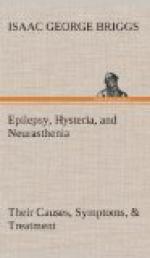To give an instance: Does the son of a drunkard inherit a tendency to drink? No! The father is alcoholic because he lacks control, consequent upon the factors which make for control having been absent from his germ-plasm. He passes on this lack; if the mother does the same, the defect occurs—in a worse form—in the son. If the mother gives a control factor, the son may be unstable or apparently stable, this depending entirely on chance, but if the mother’s plasm contains a strong control-factor, the defect will lie dormant in her son, who will have self-control, though if he marries the wrong woman he will have weak-willed children.
If the son becomes a toper, therefore, it is because he, like his father before him, was born with a defect—weak control—which might have made of him a drug-fiend, a tobacco-slave, a rake, or a criminal; in his home drink would naturally be the temptation nearest to hand, and he would show his lack of control in drunkenness.
The way a lily-seed is treated makes a vast difference to the plant which arises. If sown in poor soil, and neglected, a dwarf, sickly plant will result; if sown in rich soil, and given every care that enthusiasm, money and skill can suggest or procure, the result will be magnificent.
So with man. A well-nourished mother, free from care and disease, may have a finer child than a half-starved woman, crushed by worry and work, but neither starvation nor nourishment alter the inborn character of the child.
The body-cells are greatly changed by disease, poison, injury, and overwork, but these changes are not passed on, and despite the influence of disease from time immemorial, the germ-cell produces the same man as in ancient days. Without this fixity of character, this “continuity of the germ-plasm”, “man” would cease to be, for the descendants of changeable cells would be of infinite variety, having fixity of neither form nor character.
Epilepsy, hysteria and neurasthenia are all outward signs of defect in the germ-plasm, and so they (or a predisposition to them) can be passed on, and inherited.
If a man shows a certain character, his plasm, had, and has, the causative factor. He may have received it from both his parents, when it will be strong, or from one only, when it will be normal. If he have it not, it is absent. The same applies to the plasm of the woman he mates, so there are six possible combinations, with results according to “Mendel’s Law.”
All the children will not inherit a taint unless both parents possess it, but, however strong one parent be, if the other is tainted, none of the children can be absolutely clean, but will show the taint, weak, strong, or dormant. This means that neuropathy will recur—and that it has previously occurred—in the same family, unless there be continual mating into sound stocks. If there is continual mating into bad stocks, it will recur frequently and in severe forms. All intermediate stages may occur, depending entirely on the qualities of the combining stocks.




